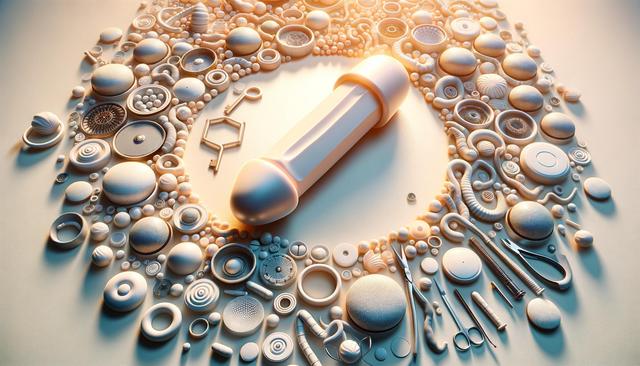Understanding Erectile Dysfunction and Its Underlying Causes
Erectile dysfunction, often referred to as impotence, is characterized by the consistent inability to achieve or maintain an erection sufficient for satisfactory sexual performance. While occasional difficulties with erections are not uncommon, persistent problems can indicate a deeper issue. Causes of erectile dysfunction can be both physical and psychological, and often involve a combination of factors. Common physical contributors include cardiovascular disease, diabetes, hormonal imbalances, and neurological disorders. Psychological influences such as stress, anxiety, depression, and relationship issues can also play a significant role in the development and persistence of this condition. Recognizing the multifaceted nature of erectile dysfunction is the first step toward finding effective solutions and improving overall sexual health.
Additional lifestyle factors can also contribute to erectile dysfunction. These include:
- Smoking and excessive alcohol consumption
- Obesity and lack of physical activity
- Chronic stress and poor sleep quality
- Use of certain medications
Understanding these causes allows men to take a proactive approach in addressing both the symptoms and the root of the problem, supporting long-term men’s health and wellness.
Exploring Medical Treatments for Erectile Dysfunction
There are several medical options available for erectile dysfunction treatment, each suited to different underlying causes and personal health considerations. Oral medications are among the most widely used and include well-known phosphodiesterase type 5 (PDE5) inhibitors. These medications, such as viagra, sialis, and levitra, help increase blood flow to the penis and enhance the ability to achieve and maintain an erection when sexually stimulated.
For individuals who do not respond well to oral medications or cannot take them due to medical reasons, alternative treatments are available. These include:
- Injection therapy: Involves injecting medication directly into the penis to induce an erection.
- Vacuum pumps: Devices that use suction to draw blood into the penis, followed by placement of a constriction ring to maintain the erection.
- Hormone therapy: In cases where low testosterone is a contributing factor, hormone replacement may be recommended.
Each of these erectile dysfunction treatment options should be discussed with a healthcare provider to determine the most appropriate and safe approach based on individual health needs and lifestyle considerations.
The Role of Psychological and Emotional Health
Psychological health is often overlooked but plays a critical role in sexual health and the management of erectile dysfunction. Mental health challenges such as anxiety, depression, and chronic stress can significantly impair sexual function, even in the absence of physical health issues. In many cases, the pressure to perform or negative past experiences can create a cycle of performance anxiety that further exacerbates the problem.
Effective strategies for addressing the psychological aspects of erectile dysfunction include:
- Cognitive-behavioral therapy (CBT): A structured approach to changing negative thought patterns and behaviors.
- Couples therapy: Helps address relationship dynamics that may be contributing to performance issues.
- Relaxation techniques: Such as deep breathing, meditation, or yoga to reduce stress and improve focus.
Addressing these psychological components not only supports erectile function but also fosters greater overall emotional well-being and intimacy in relationships.
Lifestyle Changes That Support Sexual Health
Making positive lifestyle changes can have a substantial impact on reducing the severity of erectile dysfunction and improving men’s health overall. A balanced diet, regular physical activity, and sufficient sleep are foundational to maintaining cardiovascular health, which is closely tied to erectile function. Reducing or eliminating tobacco use and limiting alcohol intake can also provide noticeable improvements.
Specific lifestyle adjustments that support sexual health include:
- Engaging in at least 150 minutes of moderate aerobic exercise per week
- Eating a nutrient-dense diet rich in vegetables, whole grains, lean proteins, and healthy fats
- Maintaining a healthy weight to reduce the risk of diabetes and heart disease
- Managing stress through hobbies, social engagement, and mindfulness practices
These changes not only improve erectile function but also contribute to better energy levels, mental clarity, and overall quality of life, making them a valuable part of any erectile dysfunction treatment plan.
When to Seek Professional Help
Although erectile dysfunction is common, it is not something men should feel compelled to manage alone. If the condition persists or worsens over time, consulting a healthcare provider is strongly recommended. A full medical evaluation can help identify any underlying conditions that may be contributing to impotence and guide appropriate treatment choices.
Men should consider seeking professional help if they experience:
- Persistent difficulties with erections for several weeks or more
- Lack of sexual desire accompanied by other symptoms like fatigue or mood changes
- Concerns about medication side effects or interactions
- Struggles with relationship intimacy linked to performance issues
Early intervention can often lead to better outcomes, especially when treatment is tailored to the individual’s unique health profile. Open communication with a healthcare provider ensures that all aspects of sexual health are addressed, supporting both physical function and emotional well-being.
Conclusion: Supporting Men’s Health Through Awareness and Action
Erectile dysfunction is a multifaceted condition that affects many men and can significantly influence quality of life and relationships. Understanding the causes—ranging from physical health issues to psychological stressors—is essential in finding the right treatment path. With a variety of erectile dysfunction treatment options available, including medications like viagra, sialis, and levitra, as well as alternatives like injection therapy and vacuum pumps, men have more choices than ever to address this condition effectively. Moreover, embracing lifestyle changes and prioritizing mental and emotional well-being can lead to lasting improvements in sexual health.
By fostering open dialogue and seeking timely professional support, men can take control of their health and enhance their overall sense of well-being. Erectile dysfunction should not be a source of shame or silence—it is a common issue with manageable solutions and the potential for a positive outlook when addressed with care and understanding.

Leave a Reply